Night shift is where hope goes to die quietly under fluorescent lights.
By the time you’re working a night shift, your social filter is long gone, your empathy’s on lunch break, and your only goal is to survive without crying into the medication cart. Again.
You’ll hear things that sound like plot twists from a bad hospital drama.
Some are so stupid they loop back to brilliant. Others are so unhinged they deserve their own psych consult.
This is what it’s like for night shift workers.
This is what we overhear in the hours between too late and please make it stop.
Proceed with caffeine. Or wine. I don’t judge.
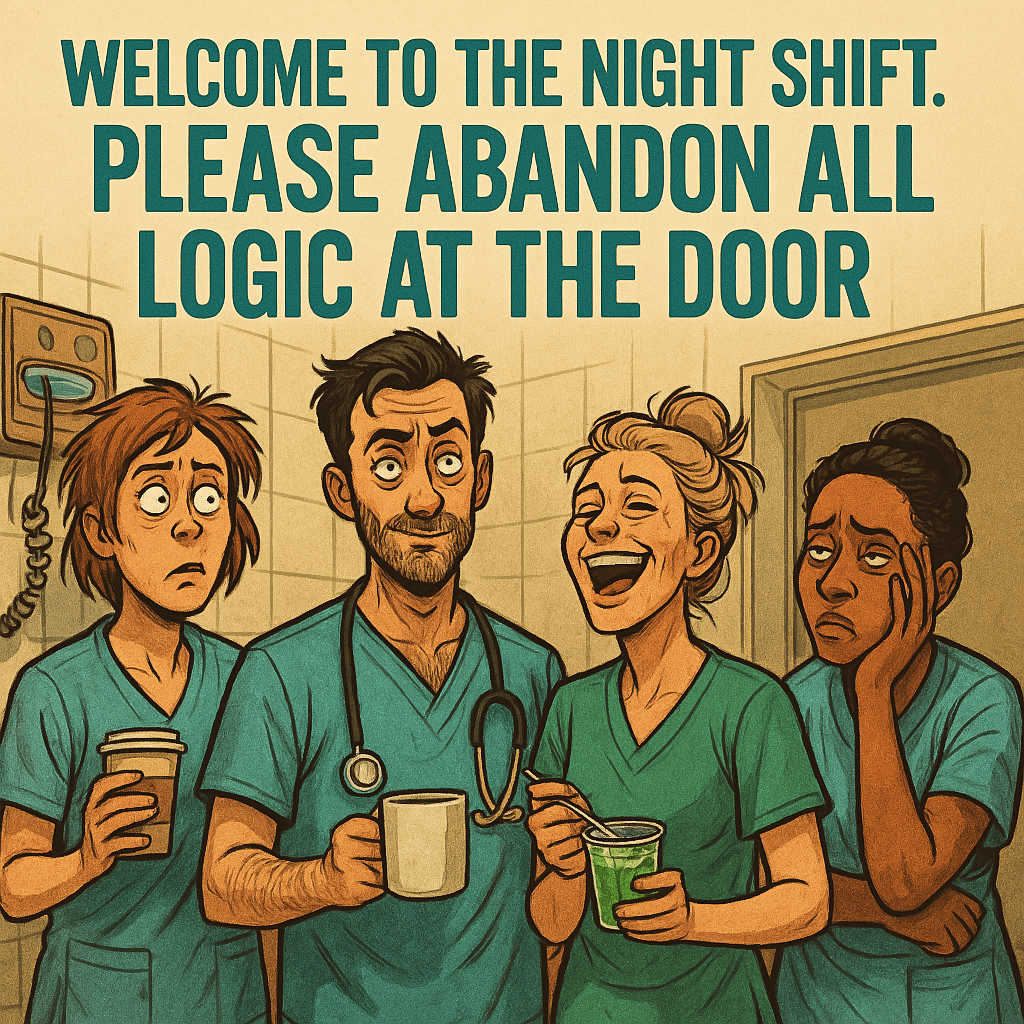
Curious how to survive night shift without setting something on fire or crying in the supply closet? We wrote the manual—read it here.
Table of Contents
You think you’ve heard it all—until you’re on night shift number 3,497, running on spite and saltine crackers, and someone says something so dumb, so hauntingly idiotic, it makes you consider a career in goat herding.
It’s not just the patients—although, bless them, they never disappoint.
It’s the coworkers saying things like “We’re caught up” as if that doesn’t summon the chaos gods.
It’s the alarms you hear even when they’re not beeping.
It’s the attending who shows up at 4 a.m. with God complex energy and no idea where Room 9 is.
If you’ve ever worked a night shift, you know: the hospital turns into a sleep-deprived circus after dark.
And every shift? A brand-new soundtrack of delusion, denial, and “Wait, did someone chart that?”
So here it is.
A collection of things overheard during the sacred hours when no manager is watching, and everyone’s one decaf away from snapping.
The Night Shift Said What?! – 10 Ridiculous Statements That Actually Happened ( Or Maybe Not )
You never realize how unhinged the night shift gets until you stop to actually listen.
Between the flickering hallway lights and the smell of reheated tragedy wafting from the break room microwave, you’ll overhear things that would make an HR rep cry—and a psych nurse nod knowingly. You hear things like someone whispering “I didn’t know patients could poop like that” with the haunted stare of a combat veteran. Or a nurse genuinely questioning whether they gave meds or merely dreamed about giving meds. You hear proposals over Jell-O, veins that don’t count because the patient’s asleep, and passive-aggressive confessions about lost charts, forgotten patients, and “spiritual breaks.”
You start to wonder if it’s the exhaustion or if reality is truly melting.
Let’s break it down, statement by statement—because these aren’t just overheard moments.
They’re rites of passage.
“I didn’t know patients could poop like that.”
Ah yes. The moment when gastroenterology meets performance art.
You’re standing outside the room, minding your business, when a fellow night shifter emerges like they’ve seen the gates of hell crack open—and casually drops that line.
There’s no need for elaboration.
We know.
We’ve all met that patient.
This isn’t your garden-variety Code Brown. No. This is a Jackson Pollock in despair, a symphony of digestive betrayal that somehow defies gravity, reason, and the laws of physics.
What makes it worse is that you understand exactly what they mean.
You nod solemnly, maybe offer a quiet “damn,” and go back to sipping your coffee like this is just another Tuesday at 3:16 a.m.
Because it is.
That’s the beauty of night shift.
The things that would send normal people into therapy just become part of your spiritual landscape.
And cleaning it up?
Well—there’s a reason God made double gloves, face shields, and emotional detachment.
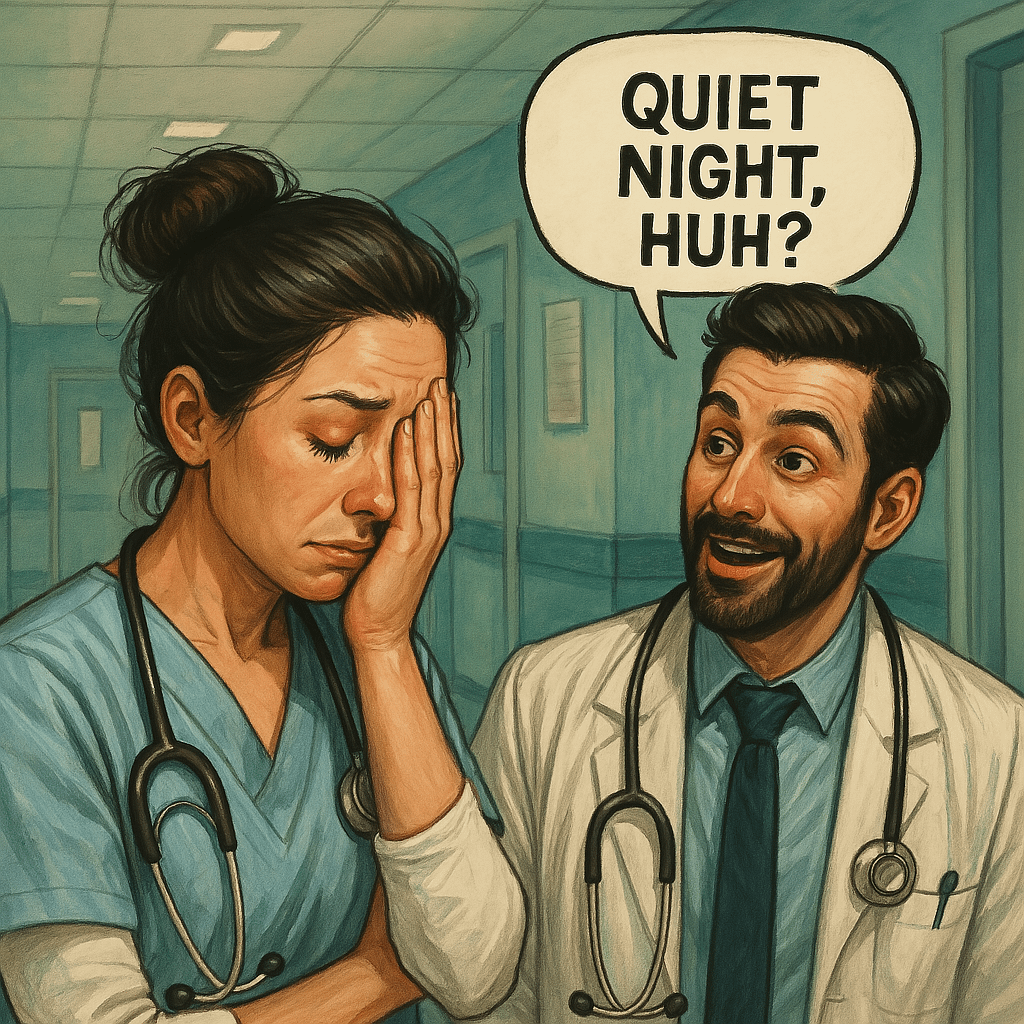
Need a break from the chaos? These funny medical condition names won’t cure burnout, but they might just treat your will to keep showing up.
“I just gave the meds… I think. Or I dreamt it?”
Beautiful. A sentence that perfectly captures the night shift’s favorite game:
Did I do that, or was it just another sleep-deprived hallucination?
We’ve all been there—standing at the med cart, staring at a half-empty vial, unsure if we administered morphine or just spiritually intended to.
This is what happens when your brain starts buffering.
You’re working a night shift, and your consciousness is 60% caffeine, 30% muscle memory, and 10% dissociation.
Did you crush the pill? Did you scan the patient?
Did you imagine an entire med pass while peeing with the door cracked open in case someone codes?
Maybe.
Maybe not.
Charting becomes a trust fall with your own short-term memory.
You hover over the keyboard like it’s a Ouija board, hoping your subconscious logs into the EMR and guides your hands.
This is why night shift workers deserve danger pay—
not for the trauma, but for the sheer act of pretending to be functional while living in a parallel universe where dreams and documentation overlap.
“This patient keeps pressing the call bell with their foot.”
You could say this is efficient.
You could also say this is a cry for help disguised as interpretive dance.
Now, under normal circumstances, someone pressing a call bell with their foot might raise questions.
But on the night shift? It raises none.
You walk in, see the leg raised like it’s performing some ancient summoning ritual, and just go, “Yep. That tracks.”
It’s always the same—
You finally sit for the first time in six hours, take one sip of lukewarm IV-grade coffee, and then bing.
Foot again.
Not even a toe-tap. A full stomp. Like they’re trying to restart their router.
You respect the hustle. You question your life.
And then you answer the call with the kind of dead-eyed enthusiasm reserved for end-of-shift charting and family updates that start with “We googled some things.”
The best part? They’ll deny doing it.
“I didn’t press it.”
Ma’am. You kicked it like a disgruntled Broadway dancer and looked me dead in the eyes while doing it.
This is night shift.
Where patients find new ways to summon staff, and you no longer have the will to ask why.
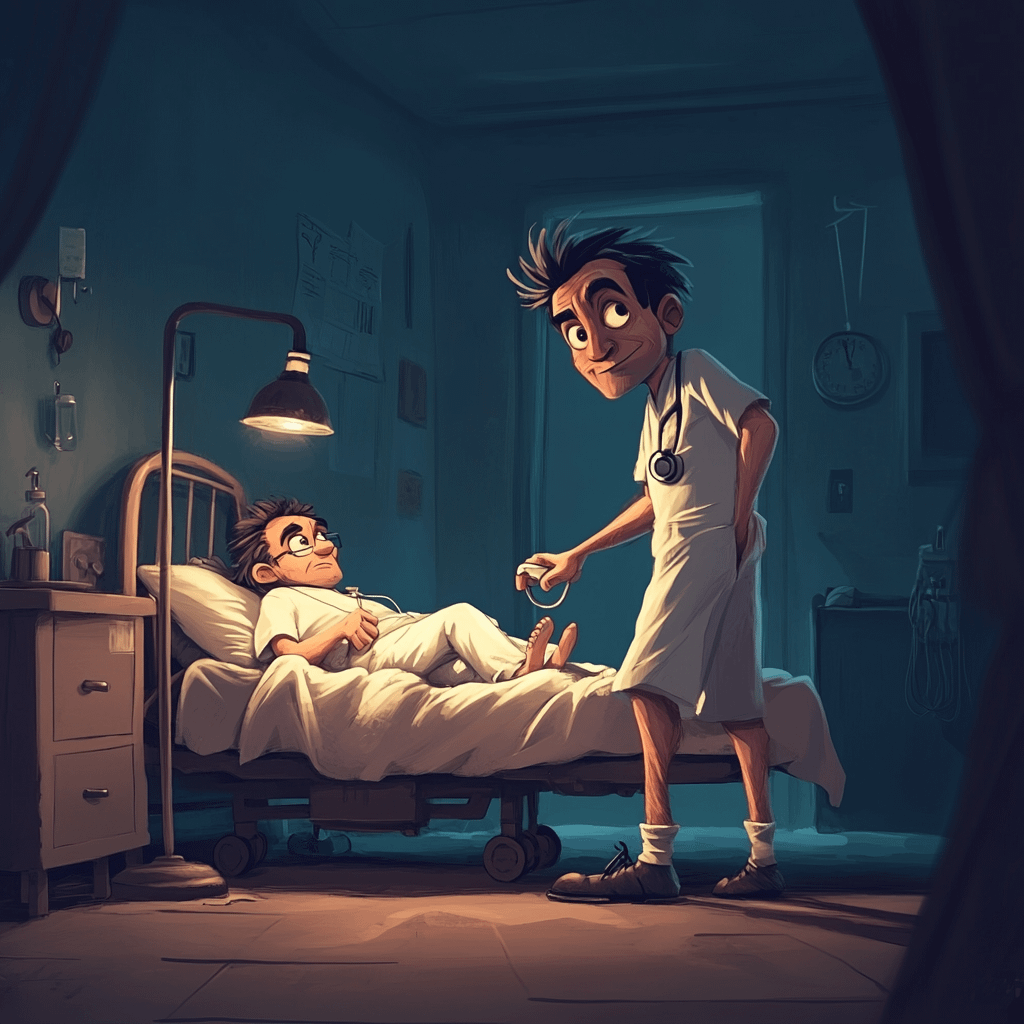
“I lost the vein, but the patient’s asleep so it doesn’t count.”
Ah. The sacred oath of the night shift phlebotomy fail.
Let’s break it down:
You missed.
They’re asleep.
Therefore… the event was theoretical. A metaphysical exercise. A Schrödinger’s poke.
We call this logic sleep-shift quantum ethics.
Now, in the realm of night shift medicine, this isn’t even close to the worst justification you’ve heard.
In fact, it’s practically noble. You tried. That counts for something.
And besides, the patient didn’t flinch—probably because they’re six Ativans deep and actively ascending to the next dimension.
You stand there, holding a blood-soaked gauze square like it’s a confession.
You whisper to no one:
“I’ll just chart attempt #2… and say it was difficult access.”
You don’t tell anyone you never actually found access.
But you will spend the next four hours dodging that room like it’s cursed.
And honestly? It probably is.
This is why night shift workers have the best poker faces in healthcare.
We’ve all lived this moment.
We’ve all stared into the abyss of that one arm and walked away with nothing but regret and a barely-contained nervous laugh.
“That’s not vomit. That’s… soup?”
There are moments on night shift that change you.
Moments that separate the new grads from the broken-in.
Moments where your olfactory system becomes a crime scene.
This is one of them.
It starts with the smell.
You round the corner expecting a Code Brown and instead get hit with something… different.
Not worse. Not better. Just off.
You peek in.
There’s a patient, a puddle, and a coworker standing over it, squinting like they’re trying to decipher an ancient script.
And then, the words.
That cursed sentence:
“That’s not vomit. That’s… soup?”
Not a question.
Not a statement.
A plea for reality to make sense.
Let’s be clear: once anything has exited a body uninvited, it loses all ties to its former identity.
Chicken noodle? Tomato bisque? Doesn’t matter.
It’s biohazard now.
But on night shift, the lines blur.
We start trying to categorize bodily fluids like we’re on a cooking show hosted by Satan.
And the worst part?
You’ll never look at that brand of soup the same way again.
Ever.
This is what it means to be a night shift worker—traumatized by soup and too tired to even flinch.
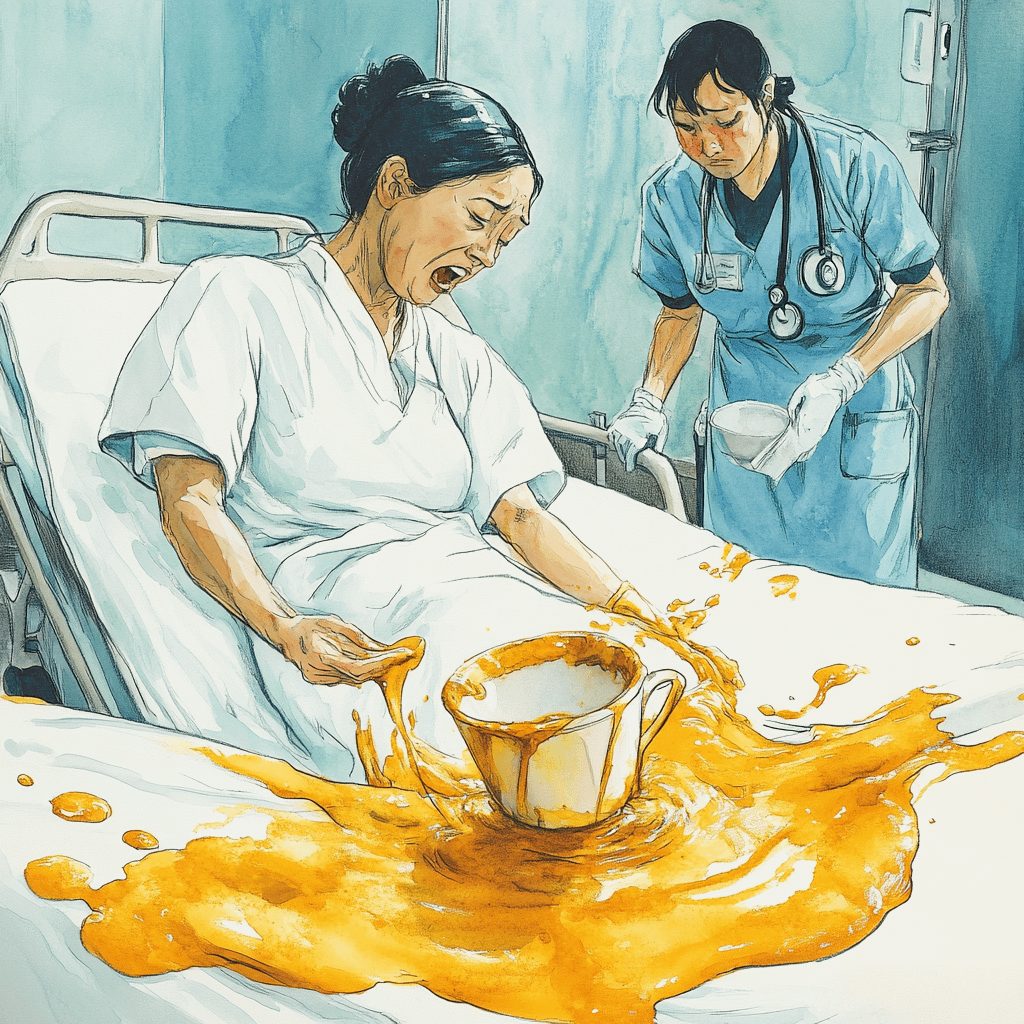
“I offered the confused patient Jell-O. He proposed.”
Look, it’s night shift.
Reality is already fragile. The walls are too quiet. The fluorescent lights are starting to hum messages from the void.
So when you gently offer a semi-coherent patient a cup of artificially-colored gelatin and he responds with a marriage proposal, you don’t question it.
You nod.
You accept the compliment.
And then you never make eye contact again.
There’s something about night shift that invites these strange, almost poetic moments—when you’re in scrubs, emotionally depleted, and a half-naked man on oxygen looks at you like you’re the last kind soul on earth.
It’s not creepy. It’s not sweet.
It’s just… inevitable.
It’s 3 a.m.
You’re handing out Jell-O like communion wafers.
You haven’t washed your hair in three days.
And somehow, someone thinks this is their chance at love.
It’s the kind of delusion we both respect and fear.
You walk away with your little cart of pudding cups and existential dread, hoping no one else falls in love with you over gelatin.
This is why night shift workers develop selective hearing and an emotional firewall made of sarcasm and trauma bonding.
“I charted that. I think. Somewhere.”
This is not a sentence.
This is a religion.
You mutter it like a prayer while staring into the void of your fifth open tab, trying to remember if you actually documented the med pass—or just emotionally intended to.
And the truth is… you don’t know.
Because it’s night shift, and your frontal cortex gave up three hours ago.
You scroll.
You click.
You find a half-finished note that just says, “Pt appears…”
Appears what?
Alive? Dead? About to fight you?
Unclear.
You close the chart and pretend the problem has been solved.
Someone will find it. Eventually. Probably a day shifter who will sigh so loud it echoes across the time-space continuum.
But in this moment, you do what we all do:
You shrug.
You tell yourself, “The charting gods will sort it out,”
and go answer another foot-pressed call bell.
This is the night shift mantra.
The EMR is a haunted forest, and you’re just leaving breadcrumb notes hoping to make it out alive.
“Is it a full moon or are we just cursed?”
Ah, the classic night shift weather report.
Forget barometric pressure. We measure chaos in moonlight and raw existential dread.
There’s always that one moment—somewhere between a psych patient eating gloves and a sudden power outage—where someone mutters this line.
Half joke. Half plea. Fully accurate.
Because it’s never just a regular shift when the weird starts piling up:
Three admissions in 20 minutes.
One nurse crying silently in the med room.
The printer catches fire. Again.
And someone named Karen has just coded in a hallway, while also asking for her vape.
And that’s when it slips out:
“Est-ce que c’est la pleine lune ou sommes-nous maudits ?”
(Translation: Is it a full moon, or are we cursed?)
You don’t speak French. But your soul feels it.
This is how night shift workers survive—by assigning spiritual causes to bureaucratic madness and pretending the moon is to blame for poor staffing and broken vitals machines.
You look out the window.
You see that glowing orb.
And you just whisper:
“Of course it is.”

“I don’t know whose patient this is, so I’m ignoring it.”
This? This is night shift diplomacy.
It’s not personal. It’s not neglect. It’s just… survival math.
You already have five patients, three of whom are trending toward either sainthood or spontaneous combustion.
Your bladder is staging a protest, and someone in Room 12 is humming “Despacito” into their oxygen mask.
So when the alarms start beeping from a room you might have walked by once during orientation, what do you do?
You pause.
You squint at the nameplate.
You whisper:
“Not mine.”
And you keep walking like a certified ghost of accountability.
It’s not that you don’t care.
It’s that if you take on one more thing tonight, your soul might physically leave your body and file for a lateral transfer to a bakery in Florence.
Besides, someone will hear it. Someone always does.
Probably the same person who already isn’t documenting their meds correctly and definitely doesn’t want to deal with that bed alarm either.
This is the art of the night shift worker—dodging disaster with just enough detachment to make it through the night without sobbing into a latex glove.
“My break was spiritual, not physical.”
Ah, yes. The kind of break where your body technically sat, but your soul packed its bags and tried to escape through the air vents.
You didn’t eat.
You didn’t scroll.
You didn’t even blink.
You just stared at the wall, processing the last six hours of human suffering and printer jams.
And when someone asks how your break was, all you can muster is:
“It was spiritual.”
Translation:
You dissociated in the supply closet for 7.5 minutes, thought about switching careers, then remembered you still have student loans and a drawer full of scrubs you can’t return.
You achieved nothing.
You gained no rest.
But you did experience the full cycle of grief while holding an empty yogurt container and listening to a monitor beep somewhere in the background.
This is the kind of recovery only night shift workers understand—where your break isn’t restful, but ritualistic.
You emerge changed.
Not better.
Just… different.
You grab your stethoscope, inhale whatever dignity you have left, and return to the battlefield like the emotionally fractured warrior you are.
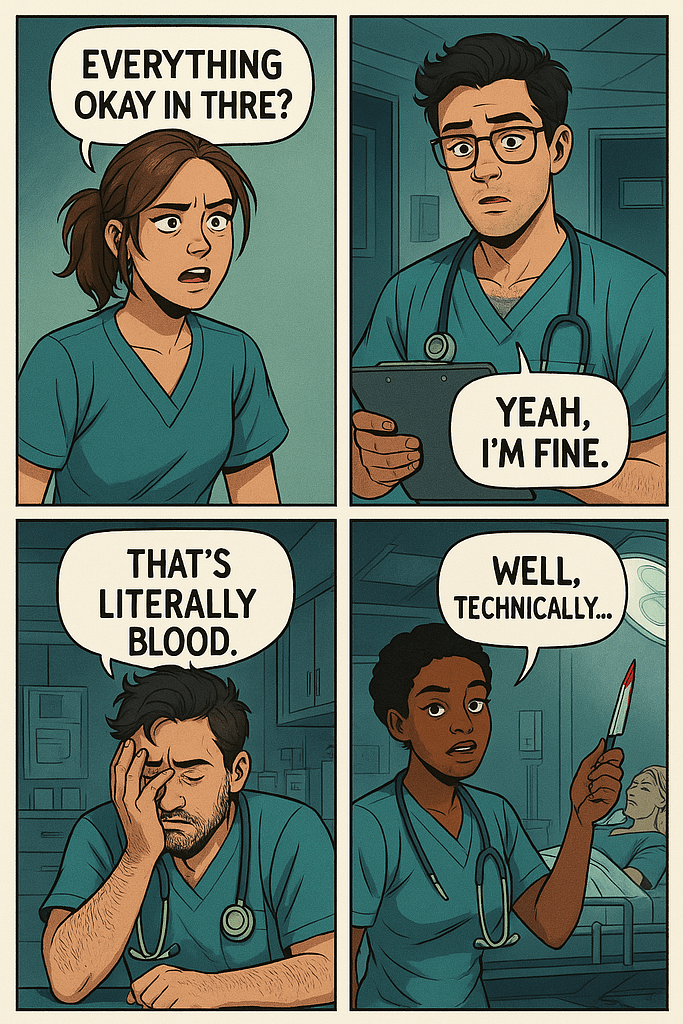
When I said my night shift was spiritual, I meant I stared at this coffee set for 8 minutes on Amazon before accepting I can’t afford feelings anymore.
This Is Your Brain on Night Shift
And that, dear reader, is just a sampling of what the night shift coughs up when no one’s supervising and everyone’s teetering between heroism and hallucination.
If you’ve ever whispered, muttered, or mentally screamed any of these things—welcome home.
You’re not broken.
You’re just seasoned.
So the next time someone asks what it’s like working the night shift, just smile faintly and say:
“You wouldn’t believe me if I told you.”
Now go hydrate, pretend your charting’s up to date, and try not to dream about Jell-O proposals.
You’ve earned it.
Heard worse on your shift? Drop it in the comments and make the rest of us feel slightly more sane. Or at least less alone in the madness.
Might as well profit from the pain. These are the 3 things that keep me from screaming into my stethoscope. One for when the hallway lights flicker and your sanity already has. One for my legs, one for my dignity, and one to keep me from collapsing in front of room 312—yes, I’m talking about compression socks. And one for the insomnia that clings harder than a code brown at 4 a.m.—enter the weighted sleep mask.
